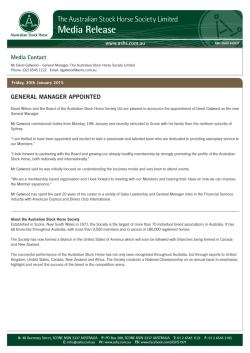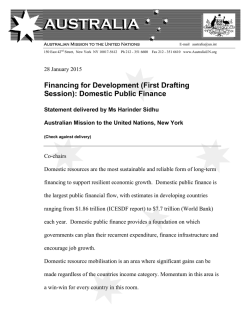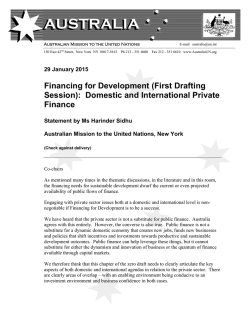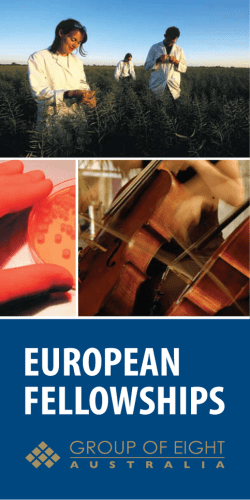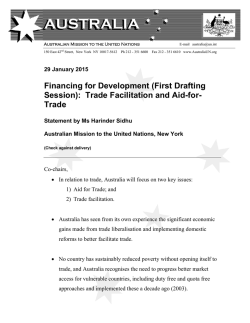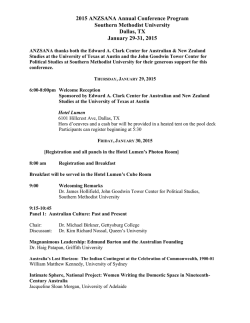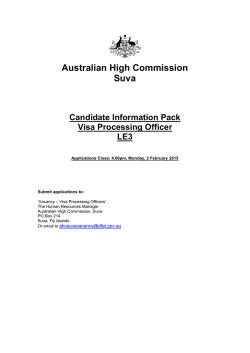
Australia - Spain Water Forum
Australia - Spain Water Forum
Interdisciplinary Approach
29, 30 and 31 October 2015
An event by
•
•
•
SIMS (Sydney Institute of Marine Science)
Cátedra Instituto Cervantes (Instituto Cervantes Australia Academic Forum)
Macquarie University
Spanish Researchers in Australia Pacific
Sponsors
•
•
•
•
•
New South Wales Trade & Investment
The Spain-Australia Council Foundation
FECYT (Spanish Foundation for Science and Technology)
BBVA
Emirates
Endorsement
•
•
The United Nations Office to Support the International Decade for Action 'Water
for Life' 2005-2015
Embassy of Spain, Canberra and the Embassy of Spain, NZ
With the collaboration of
•
The University of Sydney
Purpose of this seminar
The United Nations General Assembly, in December 2003, proclaimed the years 20052015 as the International Decade for Action ‘Water for Life’. Its primary goal was to
promote efforts to fulfil international commitments made on water and water–related
issues in the United Nations Millennium Development Goals (MDGs) by 2015.
This year is the last of the International Decade for Action 'Water for Life' 2005-2015 1. The
purpose of this seminar is to address the crucial importance of water at present, from the
point of view of health as well as energy, social and cultural development. Spain and
Australia share a high concern for water resources, water treatment and water
management, the marine environment and the economic and social implications involved.
Program
Thursday 29 October 2015
13:00
Registration
14:00 – 14:50
Conference opening
14:00-14:30 Professor Mary O'Kane NSW Chief Scientist & Engineer. Opening
Statement
Program presentation by Víctor Ugarte, Director Instituto Cervantes of
Sydney
Welcome words by Manuel Cacho, Ambassador of Spain to Australia
Ana Vila-Concejo. Chair of Australia-Spain Water Forum
14:30–14:50 Opening lecture: Professor Sakkie Pretorius, Macquarie University
Deputy Vice-Chancellor, Research.
Australia’s expertise and
collaboration with Spain regarding water resources and research
14:50 – 15:30
15:30-15:40
15:40 – 16:00
16:00 – 17:30
Keynote Lecture. Josefina Maestu, Director United Nations Office
to Support the International Decade for Action ‘Water for Life’
2005-2015. Water Scarcity, lessons from the water decade for the
implementation of the new goals in the post 2015 agenda.
Prof Jennifer McKay. Professor of Business Law University of South
Australia Business School – Discussant
Round table and Q&A with Josefina Maestu, Prof McKay, Dr Amgad
Elmahdi Manager Water Resources Assessment Section and Australian
experts
The culture of water [Chair: Cesar Espada, Deputy Head of Mission,
Embassy of Spain]
16:00-16:20 Jennifer Turpin. Artist. “The use and meaning of fresh water in
Australia and Spain: An artist’s perspective”
16:20-16:40 Chris Maxworthy. Member Australian Association for Maritime History.
“What if Spain had conquered Australia in the 18th century?”
16:40-17:00 Spanish documentary: “Aral. El mar perdido”
17:00-17:20 Isabel Coixet (video conference) Film Director. Introducing the
documentary “El mar de Aral”
17:20
1
Welcome cocktail
More information in attachment
Friday 30 October 2015
9:30 - 11:10
9:30-9:50
9:50-10:10
10:10-10:30
10:30-10:50
10:50-11:10
11:10-11:50
11:50 - 13:10
11:50-12:10
12:10-12:30
12:30-12:50
12:50-13:10
13:10 - 14:10
14:10 – 14:45
14:10-14:30
14:30-14:50
14:50-15:10
15:10-15:30
The Science of Coasts [Chair: Ana Rubio, Hornsby Shire
Council-SRAP]
Associate Professor Ian Goodwin (MQ) ASPRO Climate Risk (CoRE)
Tropical expansion and coastal evolution
Dr Ana Vila-Concejo (USYD-SRAP). Tropical and temperate coastal
research.
Professor Bruce Thom (USYD) Coastal Management in Australia
Dr Adriana Vergés (UNSW-SRAP). Climate change and the
tropicalisation of temperate reefs
Professor Peter Steinberg (SIMS) World Harbour Project
presentation
Coffee break
Sustainable water [Chair: Alberto Cerdan, Senior Trade
Commissioner, Embassy of Spain]
Dr James Hazelton (MQ) National Water Accounting Standards
Cliff Stone and Carlos Cerezo, Acciona Australia, Water
Desalination.
Peter Brew (Conultant Adasa Sistemas) Irrigation modernisation
in Australia and Spain
Brad Moggridge (NSW DPI Water) - Aboriginal cultural value
of water
Lunch
Bridging the science and industry of water [Chair: Adriana
Vergés, Senior Lecturer at the School of Biological, Earth and
Environmental Sciences UNSW]
Associate Professor Melanie Bishop (MQ). Genetic solution or
dilution: can selective breeding future-proof oysters?
Dr Ana Rubio-Zuazo ('Hornsby Shire Council'-SRAP) 'Healthy
Oysters, Healthy Waterways'
Dr Álvaro Roura- Labiaga, Department of Ecology, Environment and
Evolution La Trobe University “Octopus on the move: a genetic look
to their diet and microbiome"
Stephen Summerhayes & Simón Leiva (Cook River Alliance) Water
Sensitive Urban Design (WSUD)
15:30- 16:00 Closure and summary by SRAP organisers / Instituto Cervantes
Saturday 31 October 2015
Special Session: Spanish and European researchers in Australia
09:30 – 09:50
09:50 – 10:50
Conference opening by Prof Luis Salvador-Carulla (SRAP).
History of SRAP, intro on other associations and intro International
Federation.
10:50 – 11:20
Break
Roundtable:
Relationship
between
European
Scientific
Associations, Embassies and Consulates and Cultural
Organisations.
Chair: Dr Ren Yi, Director, Research Training and International
Research Training Partnerships, Macquarie University. Cotutelle
and Joint PhD programs
Participants:
Thomas Biedermann, Office of the Attaché for Science and Technology.
French Embassy.
Sergio Leon-Saval, University of Sydney & Vice-president of SRAP.
Dimitri Perrin, University of Queensland, Former President of the
French Research Association in Japan.
Helen O'Neil, Director Australia British Council: President of the EUNIC
Cluster in Australia.
Marian Schoen. EU Centre on Shared Complex Challenges. University of
Melbourne.
11:20 – 12:15
Who is doing what?
research centers
12:15 - 13:15
SRAP first Assembly
13:15 – 13:30
Closure
13:30
Lunch
Other Sydney, Australia and New Zealand
OPENING AND KEYNOTE SPEAKERS
Professor Mary O’KANE
Professor Mary O'Kane was appointed NSW Chief Scientist &
Engineer on 23 October 2008. She is also a company director and
Executive Chairman of Mary O'Kane & Associates Pty Ltd, a Sydneybased consulting practice specialising in innovation and major
reviews, and a company director.
Born in central Queensland, Professor O'Kane is an expert in
automatic speech recognition.
She has been a member of a number of high-level committees,
including the Australian Research Council and the panel for the Federal Government's
Review of the National Innovation System. She has chaired major reviews of the Australian
Bureau of Meteorology and the Co-operative Research Centres Program.
Professor O'Kane was Vice-Chancellor and President of the University of Adelaide from
1996 to 2001. She was Chair of the Australian Centre for Renewable Energy from 2010 to
2012. She is a former member of the Australian Research Council, the Co-operative
Research Centres Committee, the board of FH Faulding & Co Ltd and the board of the
CSIRO. She is a Fellow of the Academy of Technological Sciences and Engineering and an
Honorary Fellow of Engineers, Australia.
Professor Sakkie PRETORIUS
Professor Sakkie Pretorius is Deputy Vice Chancellor:
Research at Macquarie University in Sydney. He is
internationally recognised as a pioneer in molecular
microbiology and biotechnology, and the translation of
research outcomes to industry. Sakkie began his career in
South Africa. At Stellenbosch University, he established a
reputation for innovation and was appointed Professor of
Microbiology in 1993.
In the US and Europe, Sakkie also established a reputation for excellence: he conducted
research into molecular yeast genetics at the Albert Einstein College of Medicine in New
York and at the Max Planck Institute for Biophysical Chemistry in Göttingen, Germany, and
became a part-time professor at the Katholieke Universiteit Leuven in Belgium. In 2003,
Sakkie relocated to Adelaide with his family to become Director of Research at the
Australian Wine Research Institute (AWRI). He was also appointed Affiliate Professor in
the School of Agriculture, Food and Wine at the University of Adelaide. In 2004, he became
Managing Director of the AWRI. In 2011, he was appointed Deputy Vic-Chancellor and
Vice-President: Research and Innovation at the University of South Australia - a position
which he held until the middle of 2013 before he took up his current role as Deputy Vice
Chancellor: Research at Macquarie University in Sydney. Professor Pretorius has
published more than 200 peer-reviewed research papers and book chapters (current
Scopus H-index of 42) and presented at 550 conferences (many as an invited keynote
speaker) and research seminars.
Josefina MAESTU
Coordinator, UN-Water Decade Programme on Advocacy and
Communication (UNW-DPAC), Director, United Nations Office to
Support the International Decade for Action ‘Water for Life’ 20052015
Josefina Maestu was appointed as Director of the programme in
September 2009. Prior to her appointment, Ms. Maestu served as
senior advisor to the Minister of Environment of Spain and she
represented Spain in the Environmental Committee of the UN
Economic Commission for Europe (UNECE), the Mediterranean Commission on
Sustainable Development, and backstopped the Spanish EU Presidency. For 5 years she
was a Director of a UK based economics and environment research consultancy. With an
academic background in economics and planning, she has an extended professional career
in the field of water whiles working in international relations, national civil servant
positions and international advisor consultancies. She has coordinated the preparation of
the economic analysis of River Basin Management Plans for implementation of the Water
Framework Directive in Spain and has formed part of the EU coordination groups on
water economics. Prior to this, she was Secretary-General of the Mediterranean Water
Network for several years, and has been technical adviser to the European Commission
and UN system organizations, including the World Bank.
INVITED SPEAKERS
Thomas BIEDERMANN
Thomas graduated with a Masters Degree in General
Engineering from Ecole Centrale Marseille in 2009, with a
specialization in Organic Chemistry / Biochemistry. He then
joined the Office for Science and Technology of the Embassy
of France in the USA as Deputy Attaché for Science and
Technology. Based in Los Angeles, California, he monitored
US research output and policy, and participated in the
creation and strengthening of bilateral higher education
and research partnerships between American and French universities and research
institutions.
Following a period of travelling, he has joined the French Ministry of Foreign Affairs again
in April 2015, as Deputy Scientific Attaché at the Embassy of France in Australia. In this
role, he participates in the strengthening of bilateral links in Research and Innovation by
animating initiatives such as the French Researchers in Australia Network (FRAN).
Dr Melanie BISHOP
A/Prof Melanie Bishop leads the Benthic Ecology Laboratory at
Macquarie University. Her research focuses on estuarine and
coastal ecosystems, which are not only some of the most
important ecosystems in terms of carbon sequestration and
marine productivity, but are also areas that have borne the
brunt of human impacts. She uses field experiments to uncover
the mechanisms that maintain coastal biodiversity and its
important ecosystem functions. The contribution her research is
making to environmental management in Australia, and globally
has been recognised with the 2010 NSW Scientist of the Year Award in the Category
Environment, Water and Climate Change Sciences and the 2012 Brian Robinson
Fellowship from the Banksia Environmental Foundation.
Peter BREW
Peter is a technology strategist and businessman and is
currently consulting to the Australian office of Adasa Sistemas, a
Spanish water and environmental engineering company. Prior to
this he was General Manager for Europe for Australian water
technology company Rubicon Water. Peter has travelled widely
inspecting and advising on irrigation modernisation in Australia,
Spain, Morocco, Egypt, India, China, USA, France, Italy, Chile and
Mexico. In 2013 he presented at the XVII National Congress of
Irrigation in Mexico.
Peter holds an honours degree in Computer Science from the University of Sydney and has
held a number of senior executive positions with global technology companies, including
Associate Vice President at US stock market NASDAQ, Stockholm based OMX group of
stock markets, Computershare, GEC Marconi and Alcatel.
Isabel COIXET
Spanish film director. She is one of the most prolific film directors of
contemporary Spain, having directed seven feature-length films
since the beginning of her film career in 1988, in addition to
documentary films, shorts and commercials. Her films follow a
departure from traditional national cinema of Spain, and help to
“untangle films from their national context, clearing the path for
thinking about national film from different perspectives.”[1] The
recurring themes of “emotions, feelings and existential conflict”
coupled with her distinct visual style secure the “multifaceted (she
directs, writes, produces and acts)” filmmaker's status as a “catalan auteur”.
Amgad ELMAHDI
Dr Elmahdi has more than 20 years' experience in hydrology
and water management, including a decade working
internationally (Egypt, Italy, Netherlands and Greece) on water
resources assessment and management projects. Amgad has
also been a CSIRO research scientist, working on groundwater
and integrated water resources management and has authored
and co-authored over 90 scientific publications. Amgad
currently manages the Bureau's Water Resources Assessment
Section, which delivers products across surface water, groundwater, urban and irrigation
system, design rainfalls and the Australian Water Resources Assessment and continental
hydrological modelling system.
Prof Ian GOODWIN
Ian is Associate Professor in Climate and Coastal Risk and leads the
Marine Climate Risk Group at Climate Futures Research Centre at
Macquarie University, and is a researcher at the Sydney Institute of
Marine Science (SIMS) in the SIMS/NSW OEH Coastal Processes
Research Node. Ian has 30 years research experience in the fields of
climatology, paleoclimatology and climate change science, coastal
and marine geoscience, coastal oceanography, polar glaciology,
environmental hazard definition and impact management throughout Eastern Australia
and the South-West Pacific.
His papers have documented decadal climate variability, mechanisms for sea-level change,
wave climate change, regional coastal evolution, coral reef evolution, extratropical storm
climatology, reanalysis and reconstructions of Southern Hemisphere climate, Antarctic ice
sheet dynamics. Ian is a foundation member of the scientific advisory committees for the
Eastern Seaboard Climate Change Initiative (ESCCI) serves on the Scientific Advisory Panel
for NSW-IMOS (Integrated Marine Observing System) and is researching coastal processes
and climate change at numerous sites in NSW, SE Queensland, and the South-west Pacific.
Dr James HAZELTON
Dr James Hazelton joined Macquarie University in 2001. Prior to his
academic career, James was with PricewaterhouseCoopers, where
he worked in audit and risk management consulting in Sydney,
London and New York. James specialises in business ethics and
sustainability and has consulted, researched and taught extensively
in these areas. He recently led a team engaged by the Australian
Bureau of Meteorology to analyse the benefits of adopting national
water accounting standards and was part of a team engaged by the
NSW Office of Environment and Heritage to develop energy efficiency training for the
accounting profession. Other research interests include the ethics of corporate political
donations and incorporating contemporary ethical models into the accounting curriculum.
Simon LEIVA
Simon Leiva specialises in Water and Wastewater Industry,
having worked on a wide range of projects both in Chile and
Australia. Simon has worked for small and large enterprises, in
the private and public sector. In these companies he has
undertaken both management as well as technical roles with
multidisciplinary teams. Before starting work with the CRA,
Simon worked as the Technical Department Manager of Atlantis
Corporation Pty Ltd. The types of projects that he has been a part of include: water
efficiency; water sensitive urban design (WSUD); and on-site supervision during
construction and operation of novel stormwater treatment systems.
Prof Jennifer McKAY
Professor McKay has researched, taught, consulted on water
resource management and law issues throughout Australia and in
India and the USA and is a part time Commissioner of the SA
Environment, Resources and Development Court. In 2008, she
worked on the United Nations Expo in Zaragoza 2008, and held a
senior Fulbright at Berkeley.
She has 160 publications looking at laws and the implementation
of ESD in water management, mining and other Natural resources
issues. She has a BA Hons (Melbourne), LLB Adelaide, PhD
(Melbourne) and Diploma in Human Rights Law from a American
University in Washington DC 2009
Chris MAXWORTHY
Australian Association for Maritime History and Maritime History,
Department Member. Expert on the early colonial maritime
history of Australia and the Pacific Ocean region, from the
planning of European settlement at ‘Botany Bay’, the Nootka
Sound confrontation and the consequent Anglo-Spanish
convention, Napoleonic War, and Latin American independence.
Bradley MOGGRIDGE
Brad is a Murri from the Kamilaroi Nation (North-West NSW)
from a large and proud extended family. He grew up in Western
Sydney and now lives in Canberra. He has university Masters
qualifications in Hydrogeology from UTS and Batchelor
qualifications in Environmental Science from ACU. Brad is
employed by NSW DPI Water as the Team Leader Aboriginal
Water Initiative, and is honoured to lead the only dedicated Aboriginal water unit in
Australia. The program aims to enhance the Aboriginal communities’ awareness of water
planning and management and improve the capacity for water planning instruments to
provide opportunities for Aboriginal people to better access water. Brad has presented at
the Australian Academy of Science, also the International Association of Hydrogeologists
40th World Congress 2013, International River Symposiums – 2012 and 2014, engaged
with Maori Iwi and Water Scientists in Waikato NZ and was invited to attend the
Wentworth Group of Concerned Scientists Master Class 2013.
Dr Álvaro ROURA-LABIAGA
Alvaro is a marine ecologist working with zooplankton trophic
links, biological oceanography, biodiversity and parasite-host
relationships. He did his PhD in the Instituto de Investigaciones
Marinas de Vigo (IIM-CSIC) in 2013, about the ecology of
planktonic stages of cephalopods in coastal upwelling ecosystems.
He is currently doing a two-year postdoc at La Trobe University,
with a "Barrié de la Maza" Postdoctoral Fellowship and RFA funds
from La Trobe. His research is centred in the diet and microbiome
of Octopus vulgaris larvae during their planktonic stage in order to
apply this knowledge to captive studies
Dr Ana RUBIO-ZUAZO
Ana’s research revolves around marine ecology and aquaculture,
in particular oyster farming (edible and pearl oysters). Her work
combines environment, disease, health of catchments – waterways
and aquaculture industry practices.
Ana has a long history of working with the Australian oyster
industry, assisting them with the identification of catchment risks
and improvement of their husbandry practices as part of the
implementation of estuary-wide Environmental Management
Studies. Ana has set up oyster monitoring programs, as well as
developing catchment-wide data portals for better management of oyster areas and
undertaken research on environmental controls of oyster farms and new technology to
improve industry sustainability.
Prof Luis SALVADOR-CARULLA
Luis Salvador-Carulla is professor of Disability and Mental Health at
the Faculty of Health Sciences (University of Sydney). His field of
interest is support decision systems and policy in long-term care,
disability and mental health, and Intellectual Developmental
Disorders. He is honour member of the World Psychiatry
Association and Secretary of the WPA section “Classification,
Diagnostic assessment and Nomenclature”.
Dr Salvador-Carulla has intensively participated in the
development of international networks in the fields mentioned
above, person centred medicine, healthy ageing, and bridging and
knowledge transfer between disability and ageing. He has been advisor to the Government
of Catalonia (Spain), the Spanish Ministry of Health, the European Commission (EC) and
the World Health Organisation (WHO). He coordinated the European Commission project
eDESDE-LTC for the development of a European coding system for long term care, and he
participates in the ‘REFINEMENT’ project aimed at analysing financing, quality and
effectiveness of mental health systems in Europe. He has successfully secured competitive
grants over the last years. He chaired the WHO working group on the classification of
intellectual disabilities at chapter V of the International Classification of Diseases (ICD-11).
He received the Leon Eisenberg Award of the Harvard Medical School in 2012. He is the
secretary general of the Instituto Cervantes Academic Forum (Cátedra Instituto Cervantes)
Prof Peter STEINBERG
In 2009 Professor Peter Steinberg was appointed the
inaugural Director and CEO of SIMS. He is concurrently
Professor in the School of Biological Earth and Environmental
Sciences and Director of the Centre for Marine Bio-Innovation
at UNSW Australia, and Co-Director for the Advanced
Environmental Biotechnology Centre, Nanyang Technological
University, Singapore.
Professor Steinberg has brought to SIMS his extensive
research and academic experience together with commercial knowledge. He has been a
Fulbright Scholar, a Queen Elizabeth II Fellow and CEO of an ASX listed Biotechnology
Company focusing on the development of novel antibacterials from marine organisms.
Professor Steinberg is a distinguished researcher who has more than 130 international
publications. His research interests include seaweed ecology, diseases of marine
organisms, biofouling and antifouling, bacterial biofilm biology, marine chemical ecology
and marine biotechnology.
Stephen SUMMERHAYES
Stephen is the Cooks River Alliance (CRA)
Project Manager.
He is a solicitor of 20 years’ standing, admitted
to practise in both England and Australia. In
2003 he established his own legal firm to
support undergraduate studies in Environmental Science and International studies and,
thereafter, a postgraduate Master of Environmental Science by research. Before starting
work with the CRA he worked as the Manager of Projects and Programs at the Sydney
Coastal Councils Group. Before that, he spent two years in Latin America studying and
working for community organisations in Ecuador and Guatemala. To enhance his service
delivery he has undertaken a Diploma of Project Management, Advanced Diploma of
Management and a Cert IV in Training and Assessment. He tutors adult literacy and
numeracy and teaches philosophical ethics to primary school children.
Emeritus Prof Bruce THOM
Vice-Chancellor University of New England, Professor Bruce
Thom has held positions including Foundation Professor of
Geography, Royal Military College, Duntroon, Professor of
Geography University of Sydney and Pro-Vice-Chancellor
Research, University of Sydney. He currently holds the title of
Emeritus Professor from the University of Sydney. Bruce served
as Chair of the Australian State of Environment Committee
1998-2002, and as Chair of the Coastal Council of New South
Wales (1999-2004). He served as the Visiting Professor for Coastal Management and
Planning at the Department of Infrastructure, Planning and Natural Resources in Sydney.
He also formerly held the position of Visiting Professor in the NSW Department of
Planning. Bruce is a member of the Wentworth Group of Concerned Scientists, Deputy
Chair of the Australian Coastal Society and Chair of the Federal Government’s Coasts and
Climate Change Council (2011). In 2010 he was awarded a member of the Order of
Australia for his contribution to the ecological management of the coastal zone and as a
contributor to public debate on natural resource policy. Bruce is an honorary life member
of Surfrider Foundation Australia, and most importantly an honorary member of the
Sydney Coastal Councils Group. Bruce provided a history of the geomorphology of
Sydney’s coastline. Sydney has inherited a coast from the time the Tasman Sea opened 6080 million years ago. This geologic inheritance is critical in understanding its present
biophysical character and how it offers an array of natural assets that help drive the
lifestyles and livelihoods of the city.
Jennifer TURPIN
Jennifer is a public artist with 25 years’ experience creating
kinetic installations engaging water, wind and light as sculptural
media at the interface of art, science, nature and the built
environment. Many of the artworks, created with colleague
Michaelie Crawford, are integrated into environmental restoration
projects. Activated by nature’s elemental energies, the artworks
are rhythmic, responsive and transformative ‘performances’ in the
everyday life of the city. Puzzling, playful, mesmerising or
contemplative, they make visible the invisible and highlight the
elemental energies of nature so often taken for granted.
Jennifer is a recipient of a Churchill Travelling Fellowship. For this she will research
ancient and contemporary cultures that have developed a ‘culture of care’ in relation to
water. She will explore how some societies deliver(ed) environmentally sustainable
outcomes through attitudes to conserving, protecting, revering and reusing water. She
hopes to discover how art and design today can best bring the poetics and beauty of such
water initiatives to people’s attention.
Dr Adriana VERGÉS
Adriana is a Senior Lecturer at the School of Biological,
Earth and Environmental Sciences UNSW. Her most recent
research focuses on the ecological impacts of climate
change and the tropicalisation of temperate communities
such as algal forests and seagrass meadows. She has
worked in tropical coral reefs and temperate ecosystems
from around the world (Mediterranean Sea, Atlantic, and
Indian and Pacific oceans) and much of her research is
experimental and takes place underwater.
Dr Ana VILA-CONCEJO
Senior Lecturer and ARC Future Fellow at the School of
Geosciences, University of Sydney. Director One Tree Island
research station. Her research focuses on how water moves sand
on beaches, tidal inlets, estuaries and coral reefs. She studies
coastal processes and environments (morhodynamics) in Spain,
Portugal, Brazil and Australia. She is the chair of the upcoming
International Coastal Symposium which will be held in Sydney in
March 2016. She is in the board of the society of Spanish
Researchers in Australia-Pacífico (SRAP).
Dr Ren YI
Ren Yi is an experienced research manager and researcher
with a keen interest in the effective management of higher
degree research processes. He has been working in higher
education for more than 10 years, including positions at
the University of Melbourne, The University of
Queensland, Victoria University and the University of
Southern Queensland.
Ren is actively involved with the research management
profession. He is one of Past Presidents of the Australasian
Research Management Society and is an active member of the International Network of
Research Management Societies. He has also been appointed to different research
management committees by the Australia Research Council and by Universities Australia.
In 2009, Ren was awarded an Australian Endeavour Executive Award by Deputy Prime
Minister Hon Julia Gillard. In the same year he also won an Award for Excellence 2009
from the Australasian Research Management Society for embedding research
administration in a regional university.
He has extensive experience as a researcher. He completed his Ph.D. at the University of
Melbourne in economic geography and international business. He currently holds an
Australia Research Council grant. Dr. Yi is currently a reviewer for the Academy of
International Business and the Australian Research Council.
International Decade for Action 'Water for Life' 2005-2015
The world is waking up to the water and sanitation crisis. At the United Nations
Millennium Summit in September 2000, the largest-ever gathering of world
leaders adopted the Millennium Declaration; from the Declaration emerged the
Millennium Development Goals, an integrated set of time-bound targets for
extending the benefits of globalization to the world's poorest citizens. Target 10 in
goal 7, aims at cutting in half the proportion of people without sustainable access
to safe drinking water. At the Johannesburg World Summit for Sustainable
Development, in 2002, this target was expanded to include basic sanitation, and
water as a resource was recognized as a critical factor for meeting all the Goals.
This sanitation objective is now an integral part of target 10.
Since Johannesburg, further international deliberations on water and sanitation
have helped advance cooperation and action in this area. Significant progress has
been made since then in providing people with access to clean drinking water and
basic sanitation. But a major effort is still required to extend these essential
services to those still unserved, the vast majority of whom are poor people.
Given the magnitude of the task, in December 2003, the United Nations General
Assembly, in resolution A/RES/58/217, proclaimed the period 2005-2015
International Decade for Action 'Water for Life'. The decade officially started on
World Water Day, March 22, 2005.
The United Nations Office to Support the International Decade for Action
“Water for Life" 2005-2015
http://www.zaragoza.es/ciudad/centros/detalle_Centro?id=3264
The Water Decade Office was created with the aim of sponsoring from Zaragoza
the comprehensive management of water resources, especially the drinking water
supply and sanitation, and to be the focal point of the Organization in a matter that
affects 19 of its agencies (FAO, UNICEF, UNESCO, UNHCR, etc.) and 5 regional
commissions.
The implementation of the actions identified in the program of the Water Decade
will be held in five phases, of two years each, and for which specific guidelines have
been established with independent objectives. Thus, the priority objectives for this
first biennium 2006-2007, in which the opening of the Headquarters Office in
Zaragoza is included, are institutional development, worldwide communication
and impact, the increase of technical and institutional capacity as well as boosting
research work and socioeconomic policies.
The coordination of the overall project will take place at the Office of the Water
Decade which will interact closely with other international meetings on water such
as the Commission on Sustainable Development, UN-Water division or water
initiative of the European Union. These interactions are aimed at raising
awareness to all countries on whether to adopt sustainable policies on the
exploitation of water resources, and to develop plans for integrated management
and efficient use.
© Copyright 2026
